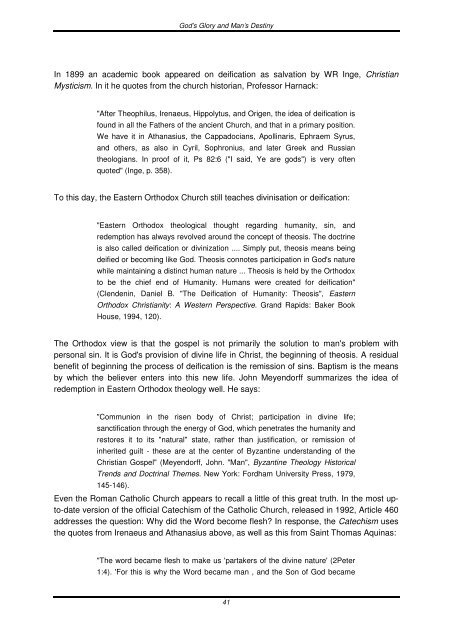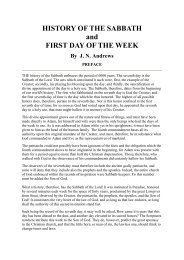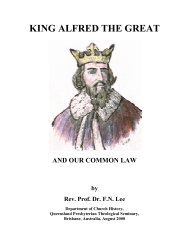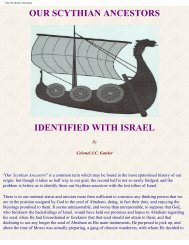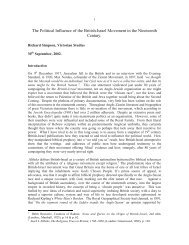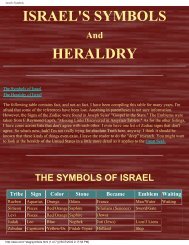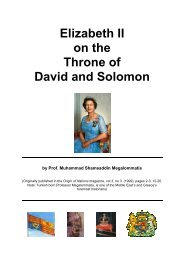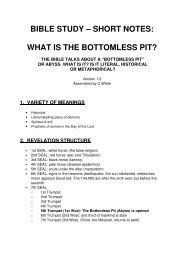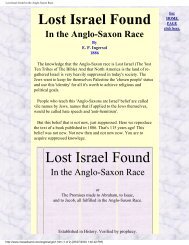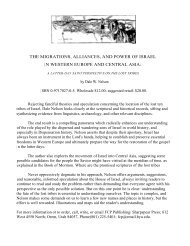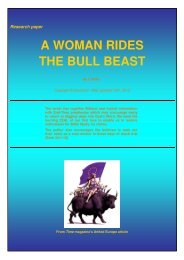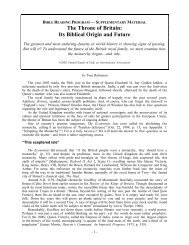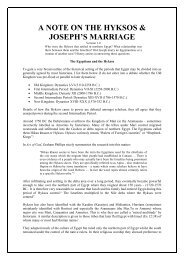Bible study By C M White - Origin of Nations
Bible study By C M White - Origin of Nations
Bible study By C M White - Origin of Nations
You also want an ePaper? Increase the reach of your titles
YUMPU automatically turns print PDFs into web optimized ePapers that Google loves.
God’s Glory and Man’s Destiny<br />
In 1899 an academic book appeared on deification as salvation by WR Inge, Christian<br />
Mysticism. In it he quotes from the church historian, Pr<strong>of</strong>essor Harnack:<br />
"After Theophilus, Irenaeus, Hippolytus, and Origen, the idea <strong>of</strong> deification is<br />
found in all the Fathers <strong>of</strong> the ancient Church, and that in a primary position.<br />
We have it in Athanasius, the Cappadocians, Apollinaris, Ephraem Syrus,<br />
and others, as also in Cyril, Sophronius, and later Greek and Russian<br />
theologians. In pro<strong>of</strong> <strong>of</strong> it, Ps 82:6 ("I said, Ye are gods") is very <strong>of</strong>ten<br />
quoted" (Inge, p. 358).<br />
To this day, the Eastern Orthodox Church still teaches divinisation or deification:<br />
"Eastern Orthodox theological thought regarding humanity, sin, and<br />
redemption has always revolved around the concept <strong>of</strong> theosis. The doctrine<br />
is also called deification or divinization .... Simply put, theosis means being<br />
deified or becoming like God. Theosis connotes participation in God's nature<br />
while maintaining a distinct human nature ... Theosis is held by the Orthodox<br />
to be the chief end <strong>of</strong> Humanity. Humans were created for deification"<br />
(Clendenin, Daniel B. "The Deification <strong>of</strong> Humanity: Theosis", Eastern<br />
Orthodox Christianity: A Western Perspective. Grand Rapids: Baker Book<br />
House, 1994, 120).<br />
The Orthodox view is that the gospel is not primarily the solution to man's problem with<br />
personal sin. It is God's provision <strong>of</strong> divine life in Christ, the beginning <strong>of</strong> theosis. A residual<br />
benefit <strong>of</strong> beginning the process <strong>of</strong> deification is the remission <strong>of</strong> sins. Baptism is the means<br />
by which the believer enters into this new life. John Meyendorff summarizes the idea <strong>of</strong><br />
redemption in Eastern Orthodox theology well. He says:<br />
"Communion in the risen body <strong>of</strong> Christ; participation in divine life;<br />
sanctification through the energy <strong>of</strong> God, which penetrates the humanity and<br />
restores it to its "natural" state, rather than justification, or remission <strong>of</strong><br />
inherited guilt - these are at the center <strong>of</strong> <strong>By</strong>zantine understanding <strong>of</strong> the<br />
Christian Gospel" (Meyendorff, John. "Man", <strong>By</strong>zantine Theology Historical<br />
Trends and Doctrinal Themes. New York: Fordham University Press, 1979,<br />
145-146).<br />
Even the Roman Catholic Church appears to recall a little <strong>of</strong> this great truth. In the most upto-date<br />
version <strong>of</strong> the <strong>of</strong>ficial Catechism <strong>of</strong> the Catholic Church, released in 1992, Article 460<br />
addresses the question: Why did the Word become flesh? In response, the Catechism uses<br />
the quotes from Irenaeus and Athanasius above, as well as this from Saint Thomas Aquinas:<br />
"The word became flesh to make us 'partakers <strong>of</strong> the divine nature' (2Peter<br />
1:4). 'For this is why the Word became man , and the Son <strong>of</strong> God became<br />
41


